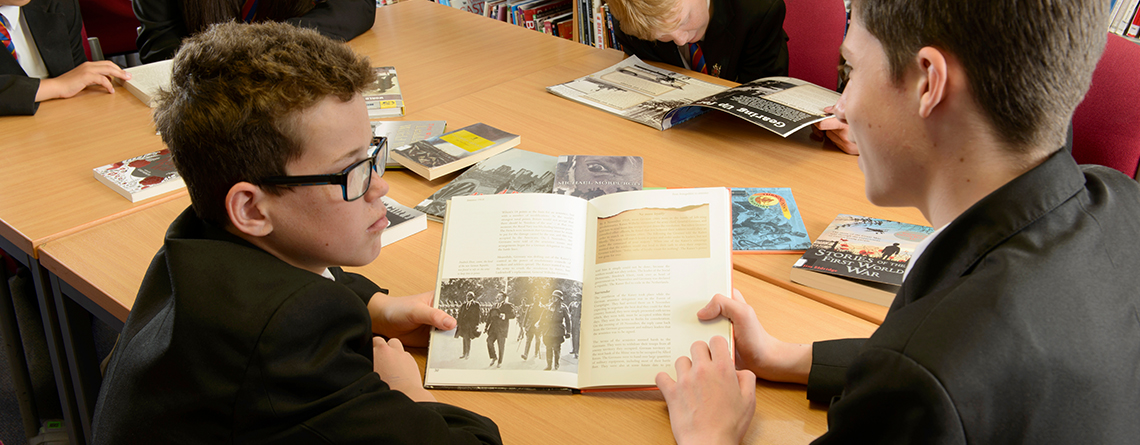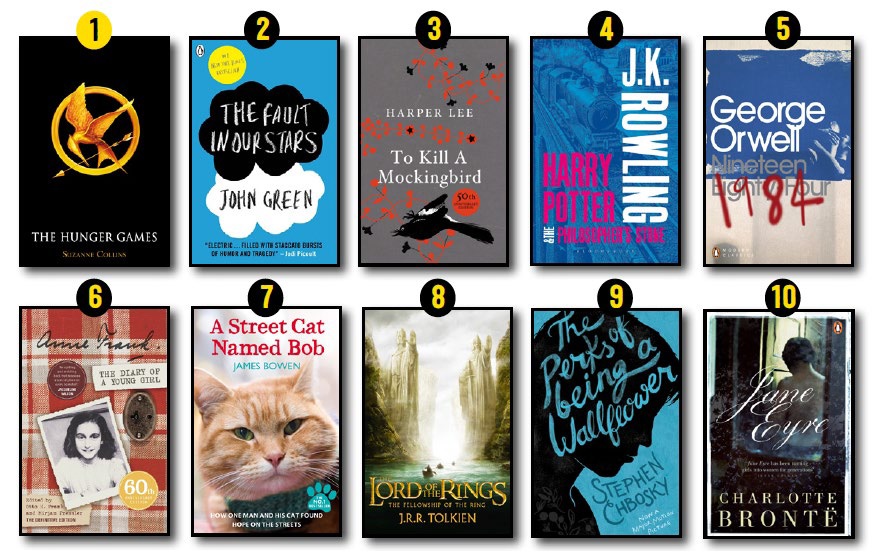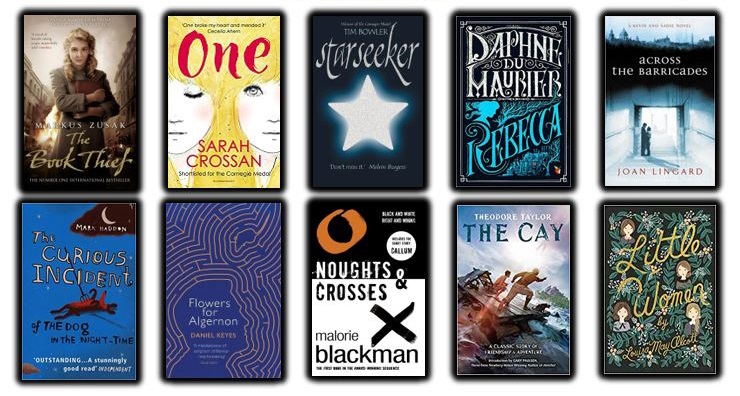
Communication
Communication: At the Root of All We Do

A holistic approach is necessary, combining endeavours in reading, vocabulary and oracy across the disciplines in order to create a logical experience for staff.
Learn to read, to read well, to read more.
Vocabulary

The limits of my language are the limits of my world.
Ludwig Wittgenstein
Words are, in my not so humble opinion, our most inexhaustible source of magic
J.K.Rowling
To learn to read is to light a fire
Victor Hugo
At Cardinal Allen we firmly believe that literacy is an essential skill to enable students to read and write as experts in every subject across the curriculum. These skills are vital for us to makes sense of the world around us. As such, the better we are at these skills, the more successful we can expect to be in life. At Cardinal Allen we recognise that improving literacy can have an impact on students’ self-esteem, motivation, behaviour and attainment.
Clear communication cannot be achieved without the necessary vocabulary to express oneself.
A robust vocabulary will improve ALL areas of communication.
A rich vocabulary is critical in giving children the capacity to think and learn about the world.
At Cardinal Allen we are committed to empowering students by widening their vocabulary. We are ambitious and aspirational with regard to vocabulary acquisition. We understand the impact that vocabulary has on quality of work, progress, and the ability to express ideas and concepts. Each subject has a published vocabulary list of 10 words each half term that is displayed on knowledge organisers and allows students to speak and write as experts. Vocabulary is tested through low-stakes quizzing, Frayer Models, semantic mapping and word walls, amongst others. Vocabulary is explored fully in all subject areas. Students’ experience reading key words in context, use new vocabulary in their written work, and develop confidence with new vocabulary in speaking tasks.
Reading
- 1 in 8 disadvantaged children in the UK do not own a single book at home
- 25% of 15-year-old pupils have a reading age of 12 or under
- Children who are weak readers will struggle as much in maths and science at GCSE as they do in English and in arts subjects.
- There is a significant connection between reading ability and success in all GCSE subjects.
...while good readers gain new skills very rapidly, and quickly move from learning to read to reading to learn, poor readers become increasingly frustrated with the act of reading, and try to avoid reading where possible.
(Southwest Educational Development Laboratory, cited in Daniel Rigney, The Matthew Effect, p. 76)
Developing a Lifelong Love of Reading
If you are going to get anywhere in life you have to read a lot of books.
Roald Dahl
Did you know that your engagement with your child’s reading can lead to gains of +3 months over the course of a year? Aside from language development and academic success,
reading has a tremendous power to offer us pleasure and comfort in what are immensely challenging times.
At Cardinal Allen, we are proud to promote reading across the school. As part of our reading strategy, some of the ways we promote reading include:
- All year groups reading for pleasure twice a week during form time;
- We also have ‘Bookbuzz’ for our Year 7 and 8 pupils where each pupil receives a free book of their choice from a set selection and these can then be used as an in-class ‘swap shop’;
- A range of library activities celebrating key events, such World Book Day or ‘Blind Date with a Book’ for Valentine’s day, for example;
- Enrichment activities such as author visits to school and book club;
- Access to the Reading Cloud
We aim to use reading strategies and develop reading skills across all subjects whilst also fostering a love of reading for pleasure.
Accessing Reading Materials
If you have a valid Lancashire postcode and are a member of your local library, you can download digital eBooks, eAudiobooks and articles using the BorrowBox app on your Tablet/ Smartphone devices. You will need your library card, PIN number and an email address to get you started. All you have to do is go to your device’s App Store, search for BorrowBox and install the App. You then log in with your borrower library number and pin and register to use the service. This will take you to your Book Shelf where you will be able to see your loans, reservations and loan history. You now have access to over 11,000 audio and ebooks and it’s FREE! Further information can be found at Borrowbox.
Reading Lists
These are the 'Top Ten' books all young people should read according to the National Book Tokens 'Writes of Passage' World Book Day list:

And here are our very own English Department Recommended Reads:

Year 7 Reading Recommendations
Year 8 Reading Recommendations
Year 9 Reading Recommendations
Year 10 and 11 Reading Recommendations
A Reading List for those wanting to push themselves with more challenging fiction texts can be found here.
After all, "The more that you read, the more things you will know, the more that you learn, the more places you'll go." - Dr. Seuss.
How can you help?
We also have some suggestions here about how you can support with your child’s reading at home.
Take turns to make plans and predictions before reading.
‘I wonder if…what do you think?’ ‘You think… Oh, I thought…’
Recap to check ideas and understanding as your child is reading.
‘So, you think …’ ‘Did you expect…to happen?’ ‘Why do you think that happened?’
Use encouragement and praise to keep children engaged in reading.
‘What brilliant ideas…let’s see what happens.’ ‘You thought so carefully about… ’
Share prior knowledge and past experiences that link to what is being read.
‘Have you learnt about…?’ ‘Remember when we watched…and found out about…’
Tune-in and listen to your child – be curious about their interest
‘I didn’t know you knew so much about…’ ‘I love reading stories about…with you.’

Oracy
Talk is the foundation of Literacy
Fisher, Frey & Rothenburg 2008.
Reading and writing float on a sea of talk
James Britton 1983
The average child hears 1500 words an hour from birth when awake. A child from a professional home hears 2100 words an hour. A child from families on welfare hears 600 words an hour
Hart, B. & Risley, T.R. “The Early Catastrophe: The 30 Million Word Gap by Age 3” 2003.
Cardinal Allen Debate Club (Thursday PM) - why join us?
- Have A Fun And Rewarding Experience.
- Bolster Your College Applications.
- Gain Valuable Skills For Your Career.
- Learn To Be An Engaged Citizen.

Disciplinary Literacy
At Cardinal Allen we do not see teaching literacy as a generic approach. Each subject teaches pupils to read, write and talk in a distinctive way. For example, the way a pupil approaches a text in science will be very different to how they approach a text in history. This approach equips our pupils with the
tools to make sense of the texts they read in their different subjects, as well as how to learn the vocabulary associated with different areas of study, and how to speak like a scientist, geographer or mathematician.

Notice: Trying to access array offset on value of type null in C:\Apache24\htdocs\php\includes\siblings-block.php on line 18



